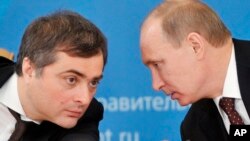MOSCOW —
President Vladimir Putin named his former deputy chief of staff Vladislav Surkov as an aide on Friday, bringing back the creator of modern Russia's tightly controlled political system just four months after he quit the government in a power struggle.
Surkov's return is likely to be seen as an effort by Putin to strengthen the more liberal camp in his Kremlin inner circle and balance out hawks who have seemed dominant since the former KGB spy began a third presidential term last year.
He was pushed from the Kremlin in 2011, after street protests against the system he helped create, and spent a year in government as a deputy prime minister before quitting in May after a dispute with investigators looking into suspected fraud.
His departure from the Kremlin's presidential administration and then from Prime Minister Dmitry Medvedev's cabinet was widely seen as a victory for conservatives.
The “gray cardinal”, so called because of the influence he wielded behind the scenes, helped build what is known as “sovereign democracy” and, as Putin's top political aide, concentrated power in the president's hands in his first, 2000-2008 term.
His sway may not be so strong this time around.
Putin's decree did not specify Surkov's responsibilities, but his spokesman, Dmitry Peskov, told Ekho Moskvy radio he would advise the president on aid to the Moscow-backed breakaway Georgian regions of Abkhazia and South Ossetia.
However, the appointment gives Surkov, who turns 49 on Saturday, access to Putin's ear early in a six-year term that the 60-year-old has said may not be his last.
Surkov could not immediately be reached for comment.
Putin likes to maintain a balance of forces around him and often rotates people he trusts into different jobs. He has a limited pool to pick from, and senior officials who quit or are dismissed rarely then openly oppose Kremlin authority.
Surkov's return is likely to be seen as an effort by Putin to strengthen the more liberal camp in his Kremlin inner circle and balance out hawks who have seemed dominant since the former KGB spy began a third presidential term last year.
He was pushed from the Kremlin in 2011, after street protests against the system he helped create, and spent a year in government as a deputy prime minister before quitting in May after a dispute with investigators looking into suspected fraud.
His departure from the Kremlin's presidential administration and then from Prime Minister Dmitry Medvedev's cabinet was widely seen as a victory for conservatives.
The “gray cardinal”, so called because of the influence he wielded behind the scenes, helped build what is known as “sovereign democracy” and, as Putin's top political aide, concentrated power in the president's hands in his first, 2000-2008 term.
His sway may not be so strong this time around.
Putin's decree did not specify Surkov's responsibilities, but his spokesman, Dmitry Peskov, told Ekho Moskvy radio he would advise the president on aid to the Moscow-backed breakaway Georgian regions of Abkhazia and South Ossetia.
However, the appointment gives Surkov, who turns 49 on Saturday, access to Putin's ear early in a six-year term that the 60-year-old has said may not be his last.
Surkov could not immediately be reached for comment.
Putin likes to maintain a balance of forces around him and often rotates people he trusts into different jobs. He has a limited pool to pick from, and senior officials who quit or are dismissed rarely then openly oppose Kremlin authority.
